20 Drawbacks to Living in an RV Full Time
This post may contain affiliate links.
With the rising cost of housing compounded by the lasting effects of COVID, RVing is more popular than ever. And remote work options mean that many are deciding to live in an RV full time—whether in one stationary location or traveling from place to place.
It’s easy to get excited about the benefits of full time RVing while overlooking some of the drawbacks. For this article, I asked full-time RVers to share what they like LEAST about living in a camper or motorhome to help those considering the lifestyle carefully weigh the pros and cons.
Below is a list of some disadvantages to full time RVing you may want to consider.
1. Initial Purchase Costs
In addition to the purchase price of the RV, you’ll also want to calculate:
- Sales tax & registration
- Insurance
- An extended warranty and/or budget for inevitable repairs and maintenance
- The cost of a vehicle to tow your RV and the equipment to set up for towing, or the cost of preparing your RV to tow a vehicle
2. The Cost of Fuel
Fuel prices are higher than ever as of the writing of this article. If you plan to move from place to place often, you may want to do some sample calculations to determine how much you’ll be spending on gas or diesel.

3. Cost of Depreciation and/or Interest
Whether you finance your RV or pay cash for it, it will most likely lose value while you own it.
The longer you own your RV, the more the gap will widen between what you paid for it and what you can sell it for. If you finance the purchase, you’ll need to add money paid toward interest to this difference.
Related: Tips for Retaining Resale Value When Renovating an RV
4. Constant Maintenance and Repairs
An RV requires a lot more maintenance than a house or a car as it involves more mechanical systems. More systems = more parts to wear out.
The parts required for a repair are often expensive and can be difficult to obtain, especially for older RVs. Hiring someone to do the maintenance and repairs for you is costly, and doing the work yourself requires time and a lot of problem-solving.
Even an RV in good working condition requires regular maintenance tasks which are labor-intensive and somewhat physically demanding, such as inspecting and resealing the roof, checking the tires, washing the exterior, and dumping/cleaning the holding tanks.
If you end up needing to leave your RV at a repair facility for any length of time, this will also mean finding somewhere else to stay (that allows pets, if you have them) until the repairs are done.
5. Mail Delivery Logistics
Receiving mail and shipping deliveries can be challenging if you’re constantly moving from place to place. It isn’t impossible but is another logistic to think about. For details on how mail works when you travel full-time, this article from long-time RVs Heath & Alyssa covers it.

6. Grocery Shopping Challenges
Several of the full time RVers I asked mentioned the difficulty of finding grocery stores in some parts of the country that carry products they enjoy or rely on.
Buying in bulk and stocking up isn’t usually a good option, since space in an RV is usually limited.
If you adhere to a particular diet such as vegan or gluten-free or use certain supplements, you may need to order some products online and have them shipped to you. Finding international products as well as a good selection of fresh fruits and vegetables can also be a challenge, especially in rural areas.
7. Finding Places to Park
One of the biggest challenges faced by full time RVers right now is that because more people than ever before are living and traveling in RVs, it has become very difficult to find affordable places to park. This is especially true in the more “desirable” locations—places with good weather or near popular tourist destinations.
The better RV parks in popular RV destinations are often booked out months in advance for their nightly spots and have long waiting lists for their month-to-month spots, making it difficult for nomads to relocate spontaneously.
This is a problem I anticipate will get worse before it gets better, but it also presents a business opportunity for people to build or campgrounds, convert unused land to RV parking spots, or renovate mobile home parks!
In the meantime, I recommend this article about how to find places to camp for free to help you find RV parking when you’re in a pinch and can’t find anything else.

8. Difficult to Visit Larger Cities
I know a lot of people choose RV life because they want to get out into nature and away from cities. But for those who need to travel to cities for work or enjoy visiting cities as a tourist, finding a place to park near a major city is usually very expensive and often near impossible. Most major cities don’t have many RV parks in them to begin with.
If you’re wanting to do some sightseeing in a city, you may be better off finding an RV park an hour or two away and then booking an AirBnb in the city for a few days. If you’re needing to travel to a major city in your RV for work, expect a long commute and/or very expensive campground fees.
Fortunately, a lot of smaller cities with affordable RV parks nearby are starting to have more of the amenities people love about larger cities, such as coffee shops, breweries, cafes, farmer’s markets, arts districts, and food trucks.
9. Staying Safe in Extreme Weather
An RV is perfect for sunny, mild weather, or the occasional rainy day. It is NOT the ideal place to be during a tornado, a blizzard, or a heat wave.
If you travel in a part of the country where tornadoes are common, you may want to take some time to research shelter options wherever you go. If the place you’re staying doesn’t have a tornado shelter, try asking some of the locals if they know of places to shelter that are open to the public. In tornado alley, you’ll often see that RV bathhouses are the tornado shelter for the property.

10. Staying Cool in Hot Weather
Staying cool in an RV during the hottest part of the summer is another challenge. Running an RV air conditioner typically requires full hookups, and even with two AC units running you may find it tough to keep your camper as cool as you would like.
Read my tips for keeping an RV cool in hot weather for some ideas to help you overcome this challenge.
11. Staying Warm & Protecting RV Systems in Cold Weather

Freezing temperatures are probably the most challenging type of extreme weather to deal with in an RV, since this type of weather can damage your RV. It can help to buy an RV that’s designed for four-season use. But even then you’ll need to take some extra precautions if you will spend time in places where the weather may drop into the single digits Fahrenheit or below.
12. Accessing Healthcare
Finding an in-network physician while on the road can be a challenge for full time RVers, especially those with chronic conditions which require frequent or specialized care. You’ll want to do your own research to find the best healthcare option for your needs, but the RVer Insurance Exchange is a good starting point for your research.
13. Laundry Struggles
Having to use laundromats or campground laundry facilities is a common complaint from full time RVers whose campers are not equipped with washer/dryer hookups.
Some RVers use portable washing machines that can be hooked up to the kitchen sink. But you have to find space for storing the washing machine when it’s not in use and you’ll need a dryer since many campgrounds don’t allow line drying for clothes.

As a full-timer, you may want to consider adding laundry to your RV. These are the best washer and dryer combos for RVs.
14. Tiny Kitchen
If you love to cook, an RV kitchen might pose some problems for you. One common issue is lack of counter space, although you might be able to supplement what’s there with the addition of a portable kitchen island or a counter-height table.

The size of the oven (or lack thereof) is a disappointment for many RVers. Most RV ovens are too small to fit a standard sized cookie sheet and have only one baking rack. For this reason, some RV owners end up using electric cooking appliances such as an air fryer more than their oven.
- THE NINJA FOODI DELUXE XL: The deluxe pressure cooker that also crisps.
15. Limited Storage Space
One of the biggest challenges of full time RV life is perhaps the most obvious: you have a lot less space.
Some full time RVers decide to rent a storage facility for their stuff when downsizing, especially if they plan to move back into a house eventually. But others who are forced into the lifestyle by necessity or are drawn to the minimalist lifestyle choose to only keep what fits in the RV. Depending on the model of your RV, this may mean making some significant sacrifices and perhaps letting go of cherished sentimental belongings or hobbies.
However, many full time RVers end up finding that what they gain with their new lifestyle makes up for what they lost.
16. Lack of Privacy / Personal Space
Less space often means less privacy for RVers who live with their partner or family.

Many full time RVing couples find that living in such close proximity to one another challenges their relationship and forces them to confront any issues in their relationship. Some couples grow closer as a result, but I have also known some couples whose relationships did not survive full time RV life.
Traveling with kids presents additional challenges when it comes to privacy, such as having to wait to use the restroom (or use campground facilities) while another family member is in the bathroom. The adults may also find it challenging to find alone time without their kids being on the other side of a thin wall. (Several RVers have blogged about their tips for keeping romance alive while RVing with kids, if you need some ideas!)
17. No Bathtub
Believe it or not, when I asked a Facebook group of full time RVers about the drawbacks of full time RVing, one of the most common responses was that they missed being able to take a bath!
While there are a few RV models with a full size bathtub, most RVs only have a shower, and it seems many people (especially women) miss getting to enjoy a nice long soak in a hot bath!
Read Next: RV Bathtub Ideas: Adding a Tub to Your RV
RVers with small kids also miss having a bathtub, although it’s fairly easy to find portable bathtubs for kids that will fit in an RV shower and fold for easy storage when not in use.

18. Shorter Showers
Another common complaint is having to take shorter showers due to a small hot water tank and/or needing to conserve fresh water.
You may be lucky enough to camp at an RV park with nice hot showers on occasion, but I’ve also had quite a few disappointing showers in public campground facilities.
One way to solve the hot water problem is to install a tankless water heater. You can even get one that uses propane so you can have hot showers without electrical hookups.
19. Dealing with RV Water and Sewage Systems
Another common response when I asked full time RVers about the disadvantages of RV life was having to deal with the various aspects of the RV plumbing system. If you travel frequently, this means finding places to dump your holding tanks as well as water sources to fill your fresh water tanks. These services are always available at campgrounds, but if you plan to boondock, it requires more logistics.
If you’re stationary, it may mean protecting your water and sewage system from freezing in cold weather.
If you choose to replace your RV toilet with a composting toilet, then properly disposing of the waste will become a regular chore. (But this option is best for boondockers!)
Even when everything is working as it’s supposed to, hooking up the water hose and sewage tanks and dumping when the tank is full is a chore that nobody loves. It’s just part of RV life!

20. Missing Friends / Family / Community
Of all the drawbacks to the full time RV lifestyle, this one may be the hardest to overcome. As humans, we need community, and it can be difficult to experience deep, meaningful connections when constantly moving from place to place.
Online communities can help to fill that role for full time RVers, as they provide a way to meet other full time RVers or others who share your interests. You may even end up making friends online that you get to meet in “real life”. The internet can also help you keep in touch with people you’ve met through your travels.
Online tools designed specifically for RVers such as the Nomad Near Me app can help facilitate meeting other RVers, as well as traditional social platforms such as Facebook and Instagram.
There are also several online communities that hold in-person meetups on a regular basis, such as Escapees and Full Time Families.
Still, while traveling full time you may miss your family and old friends. This is one reason many people choose to full time RV life for a season but eventually settle down again in one location.
Remember: It Doesn’t Have to Be Forever!
One thing to keep in mind when weighing the pros and cons of full time RVing is that deciding to pursue this lifestyle doesn’t mean you have to do it forever. It may be something you enjoy for a season, and later decide to buy or rent a house again, and there’s no shame in that.
There’s also no “right way” to RV.
No matter your reasons for living in an RV or how you choose to do it, you can benefit from the experience even in spite of the difficulties inherent to the lifestyle.
If living in an RV is something you want to do, or if you’re in a position where it’s your best option for housing, I encourage you to embrace the unique opportunities that RV living provides. Just know that it’s not all sunshine and selfies, and be prepared to learn and figure things out along the way!
Is there anything you would add to this list? Or, are you a full time RVer who feels that the benefits outweigh the drawbacks? Leave a comment below to let me know!
Ashley Mann spent three years living full time in a 38-foot, 5th-wheel RV with her husband Josiah and their cat, Kitty. Her favorite thing about RV life is the challenge of finding the perfect way to organize a space, and she loves seeing all the creative and clever ways people come up with to customize their RVs.


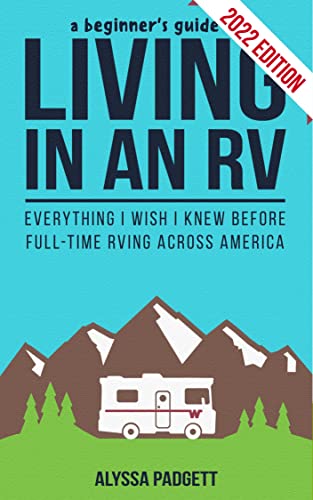







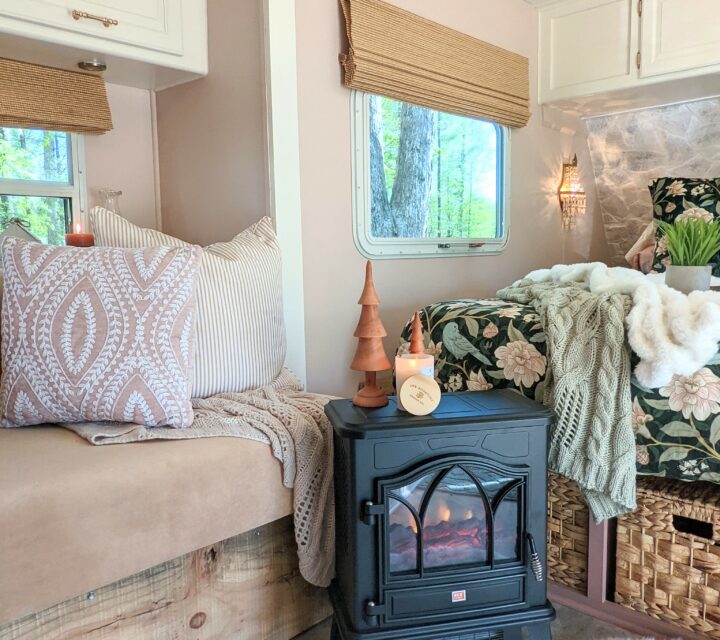
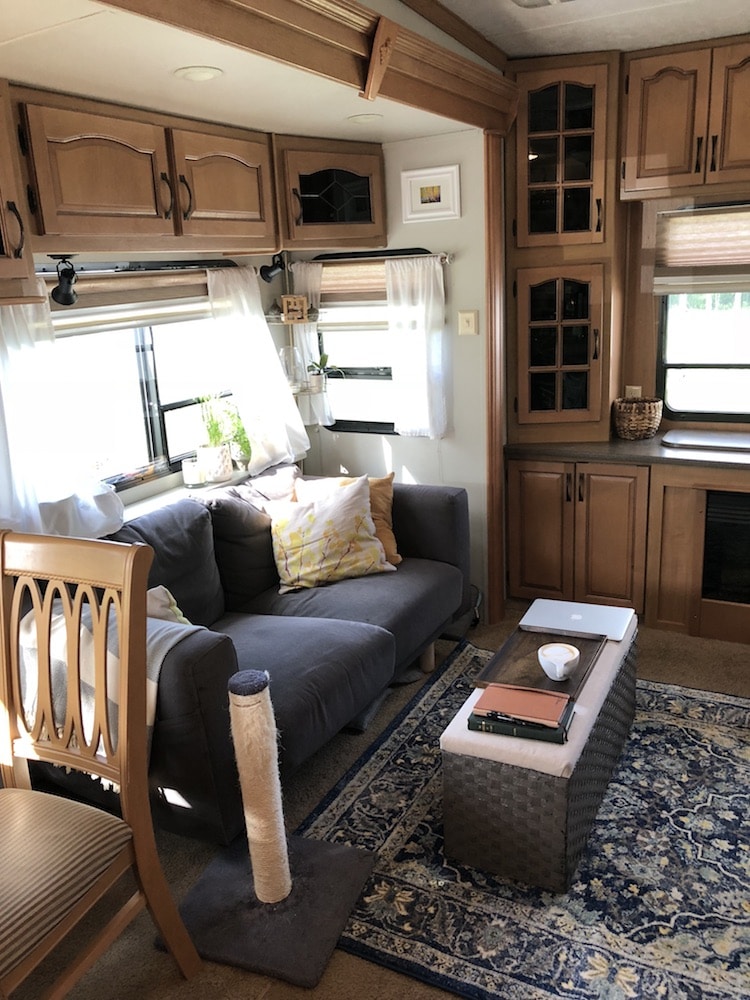
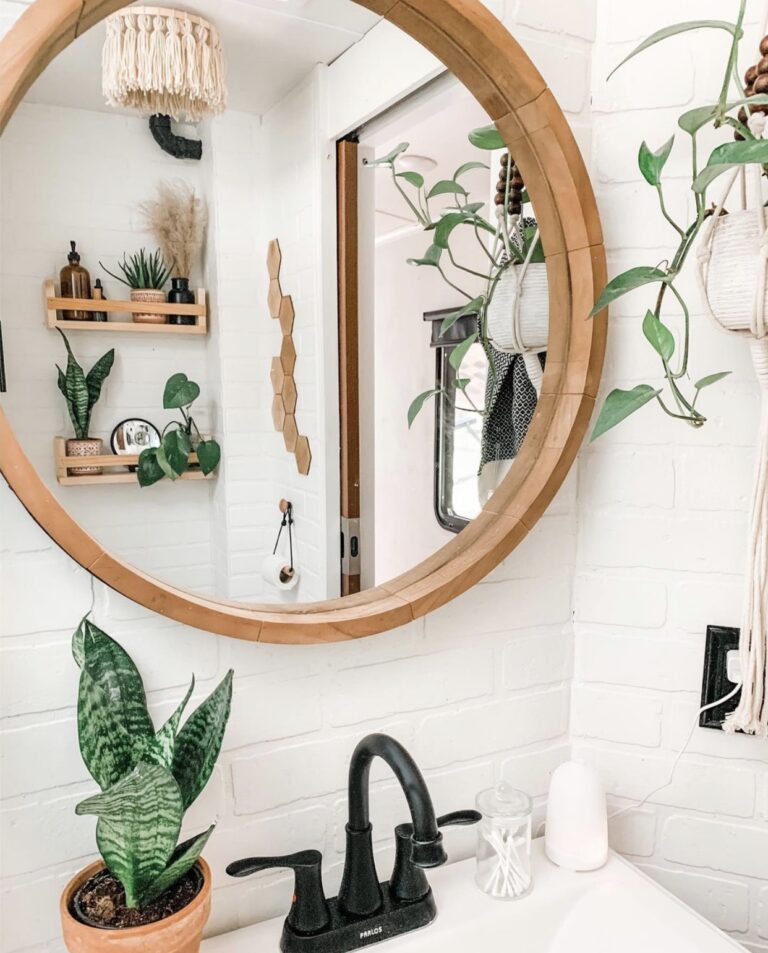
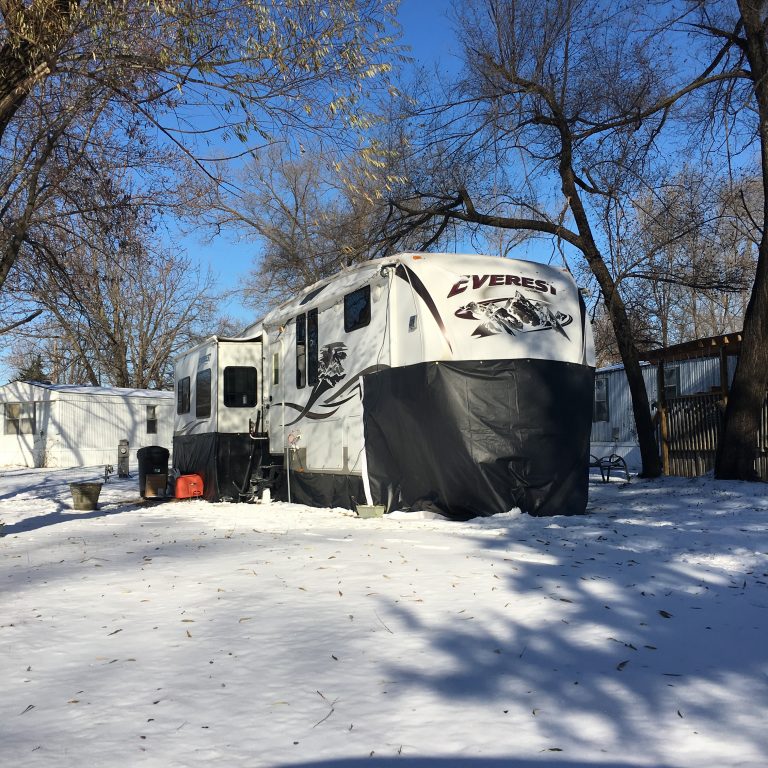
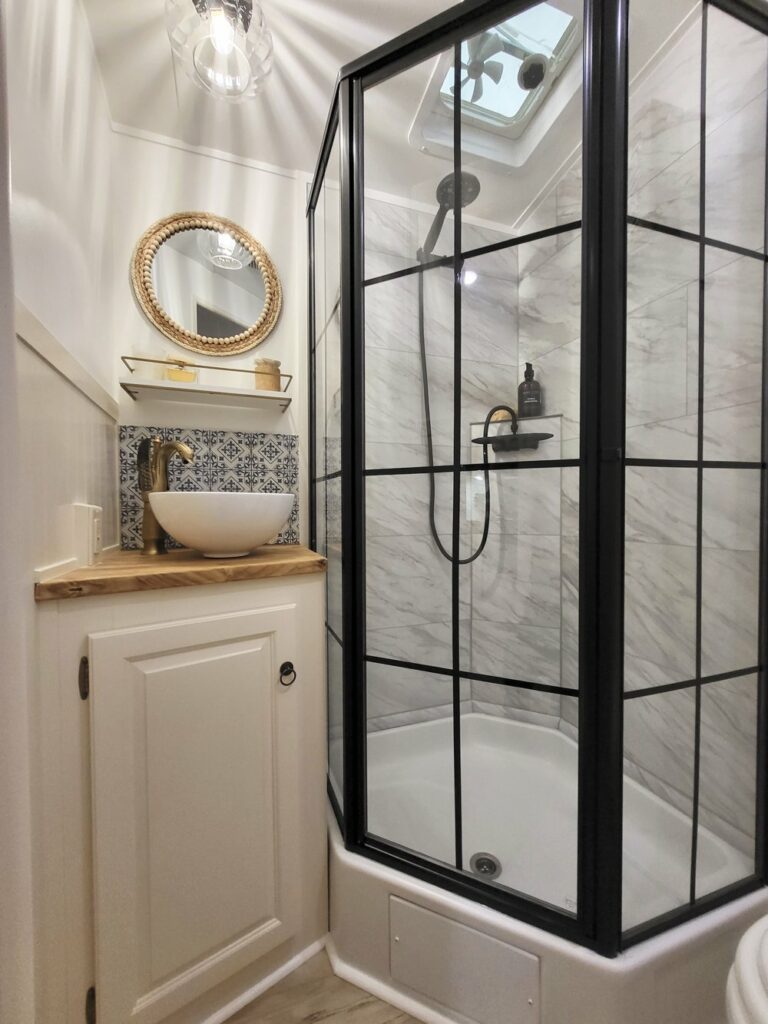
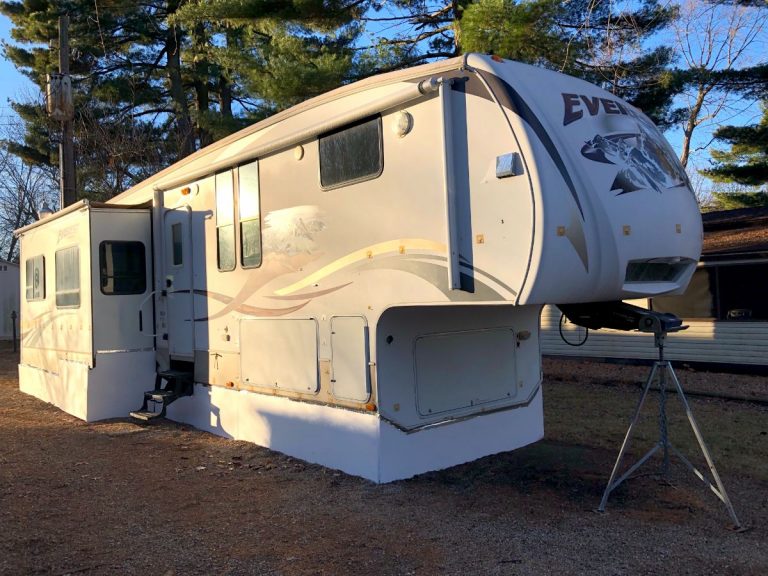
What about voting? What address do you use if you’ve given up your home to RV full time?
Most people who RV full time choose a state of domicile and set up an address there and register as an absentee voter. Here’s an in-depth article about setting up a domicile that covers voting.
Another problem is condensation in winter , (cold walls meeting warm air) and if you cook or heat with propane you will have even more moisture Where I live humidity resulting in mould necessitates a noisy dehumidifier running continually. And it means constantly turning off/on appliances so as not to exceed available amperage.
Interestingly I never experienced the condensation problem! I think it might be more of a problem for RV’s with less insulation? Regardless, I know it’s a problem for a lot of RVers, but not an insurmountable one! I wrote an article with some additional tips for dealing with condensation here. 🙂
I suggest if you do not know anything about
RVing stay away from it. To be successful in anything you need to know what you’re doing.
Many people in the last few years have gotten over their head thinking that RV life is going to be
a funzy piece of cake. Wrong wrong wrong
It takes a lot of knowledge, thoughtfulness, mechanical ability, organization, experience and sensibility. I strongly suggest learning about camping starting with a tent then maybe graduate to a pop-up camper. And don’t underestimate a pop-up camper.. they are so much fun and provide a very good education and a challenge to back up.
I agree with you in that RVing can end up being a lot more work, money, and headaches than people realize. However, everyone is a beginner at some point, and many people learn best through experience. I guarantee you that someone who knows nothing about RVing will know something about it after buying one, fixing it up, and spending a year living in it! 🙂 I myself knew nothing about it when we bought our first one, and in many ways each new one is a learning experience. Still, I don’t regret our decision to live in our fifth wheel, and as a result I now know far more than the average person about RV’s. I do think starting small or renting an RV before making a major purchase is wise advice for those who have the means to do it that way, but not everyone is in the position to be able to buy a camper for recreational use. We were only able to afford our camper by selling our house, and at that point we were all in! 🙂 Thank you for sharing your thoughts…hopefully they will be helpful to someone weighing the decision of whether or not to RV full time.
After 25 years as a full time RV’er My vehicles finally need replacement. But my income had gone down. So left all behind that I could not take in 2 suitcases. Flew one way to Panama in 2013. After lived in Ecuador, Nicaragua and last 6 years in the highlands of Costa Rica. For he last 4 years living in a 7 bed/5 bath house on 23 acres I rent for $153 a month. No heating required as it has never been colder than 54F. No cooling beyond a fan needed as it has never been over 87F. I am about to turn 76 and walk, mountain bike, have a 1200 watt electric scooter and a 10 cc gas moped to get around. Further distances and rainy weather rely on taxis or buses. My wife and I can live comfortably here on $800 to $1000 a month with enough left for me to travel Internationally 6 months a year. Watched the US go to hell past 10 years. I won’t ever be returning. Just too dangerous without a car as well as a gun there.